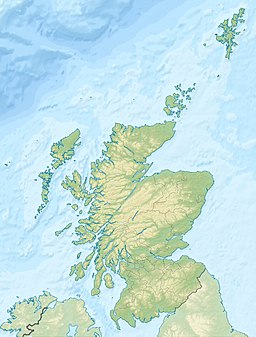Craighall Reservoir
| Craighall Reservoir | |
|---|---|
| Craighall Dam | |
 Craighall Reservoir | |
| Location | Neilston, Scotland |
| Coordinates | 55°45′51″N 4°26′16″W / 55.764117°N 4.437777°W |
| Managing agency | Elderslie Estates |
Craighall Reservoir, known locally as Craighall Dam, is one of a number of small reservoirs, situated around Neilston in East Renfrewshire, Scotland. The reservoir is located on the western slopes of Neilston Pad and has a number of well maintained public access paths. As of August 2020 it has an area of 5.9 hectares (0.059 km2).[1]
The reservoir was constructed in 1817[2] to store flood water that would ensure a constant supply of water to bleach works situated on Kirkton Burn[3]. The reservoir first appeared on Ordnance Survey maps in 1856[4].
The reservoir belongs to Elderslie Estates.
Features
The remains of a stone boathouse and small jetty are situated on the western embankment. The period of their construction is unknown.[5]
During the 1980s the reservoir was drained and remained empty for a number of years. During this period a number of trees grew in the basin and when it was re-filled the trees became a noticeable characteristic poking through the surface of the water.
Forestry
In 1995 the reservoir was a central focal point in the East Renfrewshire Community Woodland project carried out by Elderslie Estates.[6] The project seen thousands of trees planted around the reservoir creating vast woodland.
In 2019 up to 20,000 of the trees were felled to prevent the spread of phytophthora ramorum – a fungus-like pathogen that can kill or severely damage larch trees.[7] The felling damaged and disturbed a number of well utilised walking and access routes to the reservoir, most notably on the western side. Although many routes have reappeared the lack of protection from the woodland has caused the ground to retain much more water than it previously did resulting in some areas of marshland and in some cases small bodies of water.
Gallery
- Photographs of Craighall Reservoir
-
Craighall Reservoir from Neilston Pad
-
Looking towards the Neilston Pad from Craighall Reservoir
-
East Renfrewshire Community Woodland
References
- ^ "Craighall Dam Classification and Statistics". Scottish Places. The Editors of The Gazetteer for Scotland. Retrieved 14 March 2021.
- ^ Cases Decided in the Court of Session, Court of Justiciary, and House of Lords. T. & T. Clark. 1874.
- ^ Cases Decided in the Court of Session, Court of Justiciary, and House of Lords. T. & T. Clark. 1874.
- ^ "Six-inch 1st edition, 1843-1882". National Library of Scotland. Ordnance Survey. Retrieved 14 March 2021.
- ^ "Craighall Dam". Canmore. Canmore. Retrieved 15 March 2021.
- ^ "Forestry". Elderslie Estates. Retrieved 15 March 2021.
- ^ Smith, Pippa. "Thousands of Neilston Pad trees axed after disease spreads". Barrhead News. Retrieved 15 March 2021.





